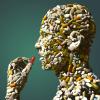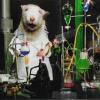Also, for those curious (as I was) about how to go about adopting that diet there is a recipe book . I highly recommend as it's one thing to have an idea of what to eat and what to avoid but going about implementing it is another task indeed. Especially if you intend to sustain it over your lifetime.
Thanks JChief, I like the idea of healthy recipes. Getting this stuff into practice is where the rubber hits the road, and often spins out. They had a couple example recipes at the site, but the files for them were missing. If you have the book, would you be willing to post a favorite recipe? I'm particularly interested in getting more raw foods into my diet in a way that could displace cooked foods.
Sure. I'll do a couple appetizers, a salad, sandwich, and a main course.
Lemon Garlic Hummus:3 cups cooked organic garbanzo beans
1/2 cup raw organic sesame tahini
1/4 cup fresh lemon juice (one lemon)
4 cloves garlic
1/8 - 1/4 tsp Real Salt (to taste)
1/2 tsp. ground cumin
1-2 T. flax oil
Soak 1 1/2 cups of garbanzo beans in pure water overnight or all day. Drain. Place the beans in a saucepan and cover with pure water by about an inch. Bring the beans to a boil, reduce heat, cover and simmer for one hour or until tender. Drain, reserving some of the cooking water. Combine the lemon juice, garlic cloves, tahini, salt and cumin in the blender. Mix until smooth. Add 3 cups of the cooked and slightly cooled garbanzo beans. Blend again until smooth, adding a few tablespoons of the cooking water or plain water if needed for the texture you prefer. Slowly pour the flax oil into the blender while blending. Chill and serve with raw vegetables. The hummus will thicken slightly when refrigerated, so make it slightly thinner than you want it, once chilled. Note: Tahini is sesame seed butter. Most packaged hummus products contain processed, toxic oils and other unhealthy additives. Use the smaller amount of oil if you are seeking to reduce weight. See the bean section for tips blah blah blah ok moving on..Basil Stuffed Mushrooms:35-40 med. crimini mushrooms or baby portobella, washed
3 cups fresh basil (or 4 oz)
3 cups raw spinach
1/4 cup lemon juice (1 lemon)
1 med. zucchini, washed, ends cut off and quartered
4 cloves garlic
3/4 cup raw walnuts
1/2 tsp. Bragg's Liquid Aminos or Real Salt
1/4 cup nutritional yeast
After washing the mushrooms, remove the entire stem, including the base. This will provide a hollow area that you can fill with the stuffing. Place the mushrooms, cap side down, on a serving plate or dehydrator tray (if dehydrating to warm). Place all of the remaining ingredients into a food processor. Pulse until well combined but not completely smooth. Using a teaspoon, fill each mushroom cap with the mixture. Chill and serve. For warm mushrooms that are still enzyme active, place the stuffed mushrooms in the dehydrator at 100 degrees for 2-3 hours or until warm. If you do not have a dehydrator and want to serve them warm, try warming them in a 325 degree oven, just until heated. This will kill the enzymes and you will not have an all raw food appetizer, but they will still be nutritious and tasty. Note: If there is extra filling, it is delicious stuffed in Roma tomatoes. Cut each tomato in half lengthwise and scoop out the seeds. Fill, chill and enjoy. Mandarin Spinach Salad:8-10 oz. baby spinach, washed
1/2 large red onion, cut into thin, 1/2 in slices
2 cups cauliflower, chopped
5 large mandarins, peeled and divided into sections (4 cups)
1/2-1 cup raw cashew pieces (amount depends on your taste)
Toss all of the above ingredients, except the cashew pieces in a large bowl. Chill. Most mandarins are seedless, but if there are seeds, remove seeds carefully. Prepare dressing below.Mandarin Cashew Dressing:1/3 cup raw cashew pieces
3 large or 4 smaller mandarins, peeled and seeded
1 tsp. lemon or lime juice
2 T. raw honey
2 T. raw apple cider vinegar (Bragg's is what I use)
Place all dressing ingredients into a high-powered blender, cashew pieces first. Blend briefly, until smooth. Toss just enough of the dressing on the spinach mixture in the bowl to coat it. Chill. Add the remaining raw cashews just before serving. Note: Extra dressing may be saved in a jar with a lid in the refrigerator for several days.Build Your Own Veggie Sandwich:2 slices sprouted whole grain bread
2 slices tomato
1/3 avocado, sliced
4-6 cucumber slices
romaine, leaf lettuce, or spinach
1/2 cup sprouts (any variety)
1 thin slice of onion
organic mustard, Grapeseed Oil Vegenaise or hummus (see above!)
Michelle's Low Salt Seasoning
Spread the topping of choice, hummus, mustard or vegenaise, on the bread. Press the thinly sliced avocado over the topping. Layer with any of the vegetables desired, lightly sprinkling the tomato slices with the Low-Salt Seasoning. Place the second slice of bread on top. Cut in half and serve. Note: Different combinations may be made using these ingredients. Add any vegetables desired to the mix. For less bread, use a romaine lettuce leaf on top instead of a second slice of bread.Stuffed Peppers:3 large green bell peppers
1 1/2 cups dry lentils
3 cups water
1/2 tsp. Michelle's Low-Salt Seasoning
1/2 cup crisp brown rice cereal crumbs or whole grain bread crumbs
1 T. ground flax seed
3 T. warm-hot water
1/2 cup onion, finely chopped
2 cloves garlic, minced
2 tsp. oregano
1 tsp. basil
1 tsp. organic pizza seasoning or Italian seasoning
1/4 cup fresh parsley, finely chopped
1 tsp. Real Salt, divided
24 oz. Bionaturae Organic Strained Tomatoes
1 T. whole grain flour of choice
1 scant tiny scoop of KAL Pure Stevia Powder
Rinse lentils and place them in a skillet with three cups of water and Michelle's Low-Salt Seasoning. Bring it to a boil, reduce heat, cover and simmer for 25 minutes or until tender. While the lentils are cooking, wash the bell peppers, carefully cut the top off, rinse and remove all seeds. Remove the lid from the lentils after they are tender and allow any excess water to cook away. Remove from heat. Using a potato masher, mash the lentils. Place them in a large mixing bowl. Place the ground flax seeds into the warm water. Stir and set aside for five minutes. This will act as a replacer for the egg. Preheat the over to 350 degrees. Prepare a deep covered casserole dish by greasing it with coconut oil. Once the lentils have cooled slightly, add the chopped onion, garlic, oregano, basil, pizza seasoning and parsley along with 1/2 tsp of the salt. Add the slightly thickened flax mixture. Mix well as if you were preparing meatballs. Then add the bread or cereal crumbs. Mix again. Once it is thoroughly mixed and will hold together, stuff each pepper, pressing the mixture down firmly and heaping the filling to form a rounded top on each pepper. Place the peppers in the prepared deep casserole dish. Open the strained tomatoes, add the stevia, remaining 1/2 tsp of salt and the flour to the glass bottle of tomatoes. Replace the lid and shake and combine well. If necessary, use a long, iced-tea spoon to stir it a bit and then put the lid back on and shake well. Pour the tomato mixture evenly over all of the peppers. Cover and bake for 2 - 2 1/2 hours or until peppers are tender when pricked with a sharp knife. Each pepper makes two servings. Serve with the tomato gravy they cooked in. Garnish with red hot pepper flakes at the table, if desired. Note: The Bionaturae Strained Tomatoes are the only organic tomatoes I have found that are sold in glass, rather than cans, and have no salt or sugar added. Most health food stores carry them or will order them upon request. They also make a tomato paste that is sold in glass jars.
















































